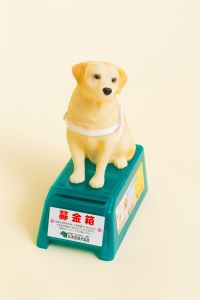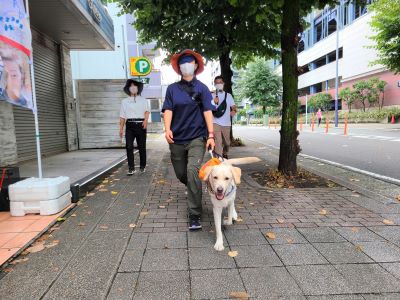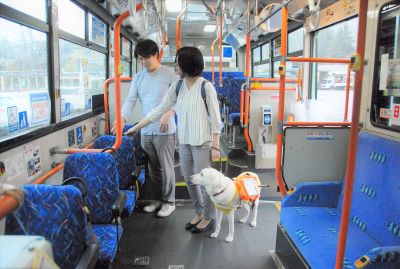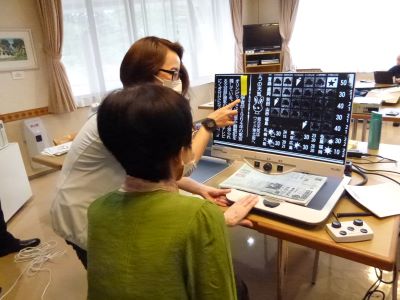To Supporters Abroad
2024. 4. 16
NewsAt JGDA, individual and corporate donations support about 90% of the cost of raising guide dogs.
We use the donations to improve the quality of life for the visually impaired, including guide dog training, cane mobility training, ADL training, computer and smartphone training, and more.
We have always received donations from abroad. We would like to take this opportunity to express our sincere gratitude to everyone who has shown their support for our program.

JGDA Donation Box
The life of a guide dog, from cradle to grave, requires a great deal of love, time, effort, and expense. Our guide dogs and related services are provided to the clients free of charge. In addition, many vision-impaired people who walk with guide dogs wish to have a second or third guide dog. As long as the visually impaired want to walk with guide dogs, we will continue to breed and provide new, high-quality guide dogs.
Birth
Fuji Harness, our well-maintained and hygienic whelping facility, hosts and observes the puppies from birth and cares for them until they are two months old.

Training
We train more than 100 dogs a year, and we need clean and comfortable kennel facilities for these dogs. We must pay for the food, vehicles, and transportation to take the dogs to the training sites. Medical facilities, medical expenses, and experienced veterinarians are essential for the dogs' health care.

A guide dog trainer in a blindfold during a test with a dog in training. Another trainer is watching for their safety and another is taking a video from behind.
Class Training
Vision-impaired people stay at the training centre for about two to four weeks to train with the guide dogs, and we do not charge them for food or lodging.
At the beginning of the class, we also provide a brand new leash, collar, and harness, which is indispensable for guide dogs.

A passenger on a bus guides a client and her guide dog to a seat.
Retirement
After retiring, guide dogs are kept at the homes of volunteers or, in cases where they require the care of specialised staff, they spend the rest of their lives at the retired dog facility within the training centre. It is also essential to maintain facilities and systems that support the retirement of dogs that have served as guide dogs.
We are also making efforts to "research breeding techniques" and "educate future guide dog trainers.”
In addition to training guide dogs, we are also engaged in various projects to support the independence of people with vision impairments.
Rehabilitation guidance in various aspects of daily life for the vision-impaired
Our staff with specialised skills provide guidance and consultation on walking with a long cane, computer operation, Braille, and activities of daily living (cooking, laundry, cleaning, etc.).

JGDA staff is showing a client how to use a reading magnifier.
Promotion Activities
To promote social participation of the vision impaired, we are also promoting understanding of guide dogs.
Based on the Act on Assistance Dogs for the Physically Disabled, we hold seminars for transportation companies and stores to promote the acceptance of guide dogs. We also actively conduct "guide dog school caravans" to promote the role of guide dogs among children, who are society's future leaders.
Guide dog users visiting Japan
We support guide dog users visiting Japan by providing a Temporary Certificate of Overseas Assistance Dog Users. The Certificate will give the visitor access rights while in Japan. Cultural education and follow-ups can also be provided for guide dog users from abroad upon request.
We ask for your continuous support to keep our services to produce guide dogs and serve the vision impaired in Japan.






